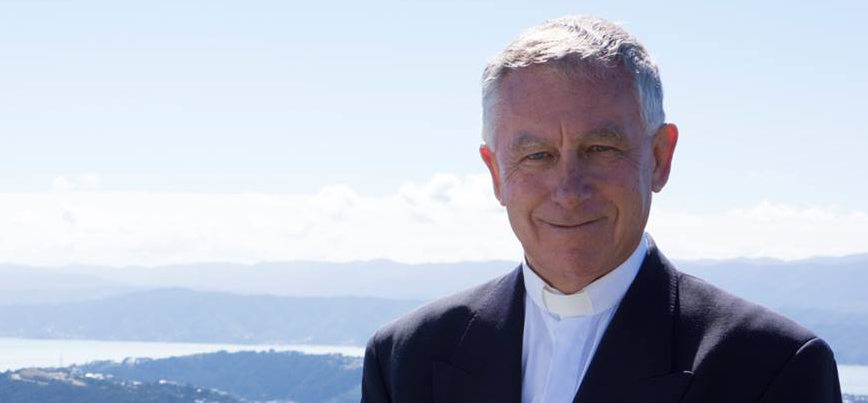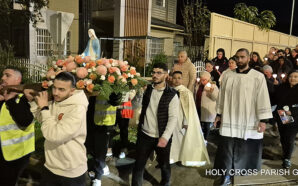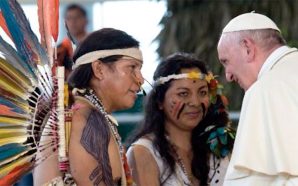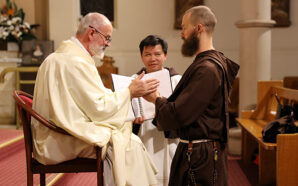His Eminence, John Cardinal Dew, gave Catholic Outlook journalist Jordan Grantham the privilege of an exclusive wide-ranging interview.
As the Cardinal-Archbishop of Wellington nears 70 years of age, His Eminence, John Cardinal Dew has a prime location from which to survey the opportunities and challenges facing the Church.
“My almost 10 years of working with the youth of the Archdiocese of Wellington and working with young men in the seminary were very helpful years for me in my priesthood,” Cardinal Dew told Catholic Outlook.
“The questions which young people ask and the paths they take in the exploration of their faith constantly challenged me in my own faith journey,” Cardinal Dew said.
“Young people face many challenges which are part of their stage in life, such as working out what is life all about and trying to establish their own identity.”
“They ask questions about who they are and how they can make their time and their lives worthwhile and meaningful.”
Little time to stop and reflect is “an enormous challenge” facing young people, he says. Work, study, sport, social life and rest all demand young people’s time and can cloud consideration of deeper things.
“That is probably highlighted even more now with their use of social media.”
“I think one of the challenges for us in the Church is to help young people to find and value the time to reflect and pray, and to know that a very simple response to the presence of God can actually be prayer.”
In the formation of identity, part of the challenge is helping youth see they belong to the Church and know what belonging to the Church means.
“In the Church we are called to support and help one another,” Cardinal Dew said.
“We are called to create warm, caring, loving, supportive environments and to look for ways to give hope to those who are struggling with life.”
This is a unified vision of being a Catholic – receiving God’s blessing and sharing it with others through prayer and action.
A little-known fact is that prior to New Zealand’s independence from the Colony of NSW in 1840, much of its civic governance came from Parramatta. As Archbishop of Wellington, the capital of New Zealand, Cardinal Dew shares Christ’s will for a caring and just society with civic leaders.
Until late 2017, civic society was led by Prime Minister Bill English, who was among the world’s most devout heads of government.
“It was a great privilege to work with him. I was always astounded at the breadth of his knowledge, his ability to talk on many issues, and the deep concern he has for people,” Cardinal Dew said.
“His faith has certainly formed him to be someone who cares for others.”
“He has a knowledge of Catholic Social Teaching and he carefully tried to apply that knowledge as prime minister.”
Regardless of his lofty spiritual and leadership positions, Cardinal Dew considers himself a “normal Kiwi bloke”.
“Like most people, there are moments of closeness and nearness to God and like most people, it can at times be a struggle to be able to pray always, as St Paul challenges us to do,” he said.
“I think I am a ‘normal Kiwi bloke’ who tries to be aware of the presence of God.”
Formerly President of the Federation of Catholic Bishops Conferences of Oceania, Cardinal Dew praises the zeal of Christians in the Pacific and the inter-Christian collaboration.
“The Church in Pacific countries is very vibrant and well-established. Its role, as it is everywhere, is to promote the Gospel and live according to its values so that people might encounter Jesus Christ.”
“It is the presence of Christ in the world, and works with the other churches in the Pacific in ways which make the countries of the Pacific very Christian compared to New Zealand and Australia.”
“The Church in the Pacific works among those who are struggling to give hope and support. It engages with the issues which face the countries of the Pacific such as poverty and injustice. It is very involved in matters to do with climate change and the threat it poses to communities and people’s livelihoods.”
Back in Wellington, a recent misunderstanding occurred regarding a Lectio Divina during Mass initiative, as was reported around the world.
“It was a response to a request from Pope Francis,” Cardinal Dew said.
“At the end of the Year of Mercy, he wrote a document entitled Misericordia et Misera and in that he asked that one Sunday a year special attention be devoted to the scriptures in one way or another, and he suggested Lectio Divina.”
“I spoke about this with my Council of Priests, the Archdiocesan Pastoral Council and at a Clergy Assembly. We decided that on a particular Sunday we would use Lectio Divina together with the Gospel of the day.”
“It was highly appreciated and we had many, many comments about how prayerful people found it, how it helped them to engage more with the scriptures and to listen carefully.”
Cardinal Dew’s advice is carpe diem – seize the day.
“My main reflection would be for anyone to make the most of any given day.”
“It is the only day that we have to learn to be grateful, to be surprised by the gifts of God which surround us all day, and to look for ways to support others, give them dignity, and hold out hope to them.”
Advocating for human dignity is one urgent way Cardinal Dew currently seizes the day.
“I have been highlighting the tragedy of human trafficking whenever possible for the last few years, after attending a conference in London which was a real eye-opener on the issues,” Cardinal Dew said.
As the Archbishop of Wellington, Cardinal Dew is able to rally Catholics in the pews to fight human trafficking and modern slavery.
“I am trying to help people in parishes to be on the lookout for the signs and the indicators that there may be someone in their own neighbourhood or their own church who is being treated in a slave-like way or whose rights are being infringed, possibly as a result of human trafficking.”
Another grave violation of human dignity that Cardinal Dew and the other bishops confront is the spectre of physician-assisted suicide in New Zealand.
“The connection between human trafficking and euthanasia is at the level of the violation of human rights and respect for the human dignity. Where people don’t respect the life of another, it can easily lead to the cheapening of life and disregard for the person.”








